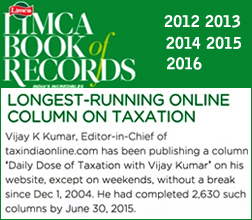 TIOL-DDT 2919 TIOL-DDT 2919
30 08 2016
Tuesday
IF by any chance you pay less duty than what is payable, even for no fault of yours or beyond your control, you are liable to pay the duty with interest and possibly a penalty.
The converse is not true!
What happens if you pay more duty?
If you, for any reason, pay more duty than legally required, logic would say that you should get a refund. But refund and indirect taxes are sworn enemies in India. Since the concept of 'unjust enrichment' entered the arena of refunds in taxation in 1991, claiming a refund has become a rather futile exercise and fighting court battles for refunds is absolutely ridiculous.
If the fragile framework of refund could suffer yet another blow, it came from the Supreme Court yesterday.
One of the main conditions for getting refund is that you have to prove that you have not passed on the incidence of duty to any other person. It is presumed that excise duty is passed on to the buyer. Now what is this 'buyer'? is it the first buyer or all the subsequent buyers till the consumer?
The Madras High Court in Addison & Co Vs Commissioner of Central Excise - 2003-TIOL-396-HC-MAD-CX, observed,
The language employed in Section 11B therefore is not capable of being construed as having reference to the ultimate consumer of the product. What has to be demonstrated by the claimant is that the burden of the duty paid had not been passed on by him to any other person. The passing on will occur only if the person who claims refund of duty has shifted the burden to another. There can be no passing on of the incidence of the duty if he merely reduces his burden by receiving the refund. The possibility that the dealer who has obtained goods from the manufacturer may charge to his buyer the full amount of the duty ignoring the refund received by the manufacturer cannot be a ground for denying refund to the manufacturer.
16. The word 'buyer' used in Section 12B also cannot be construed as referring to the ultimate consumer. The buyer referred to therein in the normal circumstances is the buyer who buys the goods from the person who has paid duty.
The primary object of the provision which is intended to deter or prevent unjust enrichment is to prevent enrichment of the person who has paid duty and who seeks refund of the same. It is not directed at the buyer who has entered into arms length transactions with manufacturer and has sold the goods to sub-dealers, retailers or consumers.
This case is in appeal before a Larger Bench of the Supreme Court, which gave its ruling yesterday.
The Supreme Court observed,
There is no material brought on record to show that the buyer to whom the incidence of duty was passed on by the Assessee did not pass it on to any other person. There is a statutory presumption under Section 12-B of the Act that the duty has been passed on to the ultimate consumer.
The Assessee who did not bear the burden of the duty, though entitled to claim deduction, is not entitled for a refund as he would be unjustly enriched.
And the High Court Order was set aside. So, if you want refund you will have to prove that the incidence of duty has not been passed on till the last buyer/consumer! Amen!
Refund - Credit Note transaction acceptable. It is a trade practice to give credit notes and debit notes during the course of business, but this is a concept which is not well understood by taxmen, lawyers and judges. When the incidence of duty is originally passed on to the buyer, but later that amount is returned to him by credit note, what is the problem for the department to agree that incidence is not passed on? The department has created a theory that post clearance transaction by credit notes will not satisfy the requirement of not passing on the incidence.
Thankfully, the Supreme Court has put an end to this controversy. The Court held, "Assessee is entitled for filing a claim for refund on the basis of credit notes raised by him towards turnover discount".
You may win the refund on the 'credit note' front but you will not get the refund if you cannot prove that the incidence is not transferred till the last link in the chain.
Please see Breaking News for more on this case.
Please also see The Gods Must Be Crazy - Part IV - "Tax refunds are receding mirages in the expanding desert of impossibilities"
Customs -Self Assessment - Pay Anti Dumping Duty or Face Severe Penal Action - JN Customs
THE JN Customs in a Public Notice draws the attention of Importers, Customs Brokers and the members of the Trade to 'Self-Assessment' provision in the Customs Act which has been implemented w.e.f. 08.04.2011 vide Finance Act, 2011 by making suitable amendments to Sections 17,18,46 and 50 of the Customs Act, 1962.
The Public Notice further states,
- Self-Assessment, inter alia, enjoins the importers to correctly declare value, classification, description of goods, exemption notifications etc. and self assess the duty thereon, if any.
- Further, it is categorically mentioned in the 'Self-Assessment Manual' that importers could face penal action on account of wrong Self-Assessment made with intent to evade duty or avoid compliance of conditions of notifications, Foreign Trade Policy or any other provision under the Customs Act, 1962 or the Allied Acts.
- However, during the course of examination of the goods, post clearance audit and regular audit, it has been noticed that in many cases the importers/CHAs are not fulfilling their aforesaid obligation, inasmuch as the applicable Anti Dumping Duty have not been found to be paid in specific cases of import of Methyl Acetoacetate, Pentaerythritol, Morpholine, Acetone, Hexamine and some of the Rubber Chemicals.
- It is the responsibility of the importer/CHA to inter alia make correct declaration regarding leviability of Anti Dumping Duty in the Bills of Entry filed under self assessment procedure. Failure to do so, on detection, would attract severe penal action as deemed appropriate under the Customs Act, 1962.
Commissioner of Customs, NS-III Public Notice No. 114/2016., Dated August 25 2016
FTP - Export of Red Sanders wood by Government of Andhra Pradesh & Directorate of Revenue Intelligence (DRI) - Revision of quantity
(i) THE total quantity of Red Sanders wood in any form, bulk or value added, permitted to the Government of Andhra Pradesh for export stands revised to 8498.095 MT which subsumes the quantity of exports already made by the Govt. of Andhra Pradesh under the Notification No. 47 (RE-2013)/2009-2014 dated 24.10.2013 and under Public Notice No. 42 (RE-2013)/2009-2014 dated 03.12.2013.
(ii) Time upto 30.04.2017 has been allowed to the Government of Andhra Pradesh & Directorate of Revenue Intelligence (DRI) to finalize the modalities and complete the process of export of respective allocated quantity of Red Sanders wood.
DGFT Notification No. 24/2015-2020., Dated: August 29 2016
Scheme of Rebate of State Levies on Export of Garments 2016
THE Union Ministry of textiles has notified the rebate of state levies, to the garment exporters, as announced in the special package for garment sector.
The rebate shall be given under the 'Scheme for rebate of state levies on export of garments 2016'. The scheme will come into effect from September 20, 2016 and will remain in operation for a period of three years.
The main objective of the scheme is to provide for remission of State Levies in addition to the Duty Drawback Scheme, through the Scheme for Rebate of State levies on Export of Garments on an average basis only.
The scheme proposes that the rebate shall be disbursed from budgetary allocation of Ministry of Textiles using the Customs EDI system through which the exports are processed for Drawback, routing list of payments with digital signature to e-PAO, CBEC for disbursal into the exporter's bank accounts. In case of manual shipments, list of payments would be routed to PAO, CBEC.
In order to operationalise the above mentioned Scheme, it has been decided that the officers who are presently designated as Drawback DDOs at the respective Customs locations are to be designated as the DDOs for this scheme. The DDO codes presently being used by these DDOs are to be mapped to the respective Customs locations while transmission of the E-bill / scroll by the Directorate of Systems to the e PAO.
Now, the Directorate of Systems of CBEC wants the Commissioners to send him the list of Drawback DDOs.
CBEC Directorate of Systems F.No. IV(23)/14/2016-Systems., Dated: August 26 2016
If there would have been a court above the Supreme Court, more than 50% of the cases would have been overruled.
- A Supreme Court Judge
|
Until Tomorrow with more DDT
Have a nice day.
Mail your comments to vijaywrite@tiol.in |









 Download PDF
Download PDF




